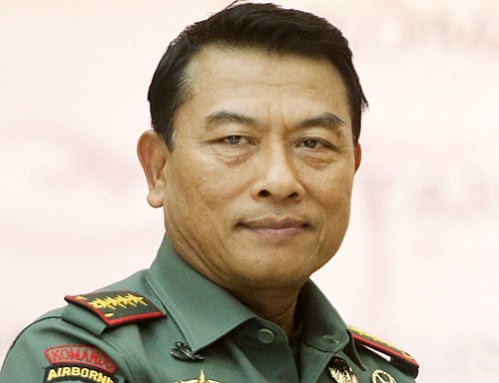[Editor's note: The following guest commentary is written by Gen. Moeldoko, commander of the Indonesian National Defense Forces and Gen. Vincent K. Brooks, commander of U.S. Army Pacific.]
Indonesia and the United States have been developing a strong military bond for a number of years. This bond reflects the growth of Indonesia's democracy, the great strides toward professionalism that have been made by Indonesia's armed forces, and the strategic importance both countries place on our security ties under the Indonesia-U.S. Comprehensive Partnership. We have repeatedly demonstrated the growing value of our military cooperation for peacekeeping, disaster relief, intensified joint training, and modernizing weapons systems. As new priorities and challenges arise, the Indonesia-U.S. military relationship will be ready to respond.
Nowhere is the value of the military relationship more tangible than in disaster relief. This month we will commemorate the 10th anniversary of the tsunami that devastated Aceh. Out of this tragedy, we witnessed the best our militaries have to offer as Indonesian and American soldiers worked side-by-side in a tireless effort to save tens of thousands of lives. The Indonesian military's growing capacity to respond to natural disasters is a well-earned source of pride and a continued focus of our joint training.

Gen. Moeldoko
Photo Credit: Courtesy
Just a few weeks ago, the United States joined more than 20 other nations participating in a major peacekeeping exercise in Sentul, Indonesia. This exercise was the largest international peacekeeping training event in the world in 2014. It provided opportunities for each nation's soldiers, sailors, airmen and marines to renew relationships that had been forged during earlier missions and to gain new respect for each other's capabilities in the demanding and vital areas of peacekeeping and crisis response.
As the exercise progressed, we -- General Moeldoko and General Brooks -- had the opportunity to reaffirm the importance of our cooperation. We also talked about the challenges our respective countries face countering transnational threats. Furthermore, we both agreed that establishing inter-operability among military partners and allies is not just favorable but critical to overcoming these complex challenges.

Gen. Vincent K. Brooks
Photo Credit: Army
The peacekeeping exercise occurred during a crucial time period when all our nations face a common threat from the barbaric actions and hateful ideology of those who have claimed the title of Islamic State of Iraq and the Levant (ISIL). ISIL's acts of cruelty run counter to the fundamental values of all civilized nations, including Indonesia and the United States. Countering ISIL will require a comprehensive strategy that brings together the international community's diplomatic, law enforcement, intelligence and military assets to counter ISIL's hateful ideology, stop the flow of foreign fighters to and from Iraq and Syria, cut off financing for ISIL, and ultimately, to destroy terrorist targets.
Indonesia's new administration has laid out a bold, strategic vision as a maritime nation. Indonesia and the United States have a history of maritime cooperation including counter-piracy missions in the Indian Ocean and closer to Indonesia in the Strait of Malacca. The Indonesian and U.S. militaries are well-positioned to increase our exchanges, joint exercises and capacity-building programs to support Indonesia's increasing investment in its maritime security.
The Indonesian and the United States militaries possess an extensive bilateral relationship built on mutual respect and professionalism, and shared beliefs in democracy, rule of law and respect for human rights. The increasingly strong and dynamic relationship between our armed forces, based on our shared values and mutual respect, means that we are better prepared to respond to new priorities and face emerging challenges to safeguard our citizens in the years to come.
The writers:
Gen. Moeldoko was appointed as the commander of the Indonesian National Defense Forces on Aug. 30, 2013, after serving as the Indonesian Army chief of staff. He holds a PhD from the University of Indonesia and is married with two children.
Gen. Vincent K. Brooks took command of U.S. Army Pacific on July 2, 2013. The command's area of operations covers half the globe and consists of 36 nations and six of the world's 10 largest armies.
America's Theater Army in the Pacific postures and prepares the force for unified land operations, responds to threats, sustains and protects the force, and builds military relationships that develop partner defense capacity contributing to a stable and secure region.




